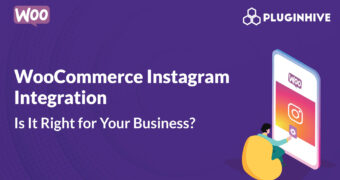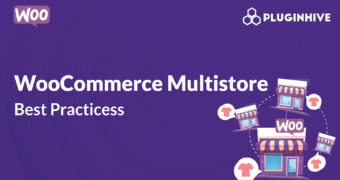Get best WooCommerce Plugins > Instagram stands out among tons of social media platforms as…
How to Generate More Email Subscriptions With the Same Traffic Volume (A beginner’s Guide to Lead Magnets)
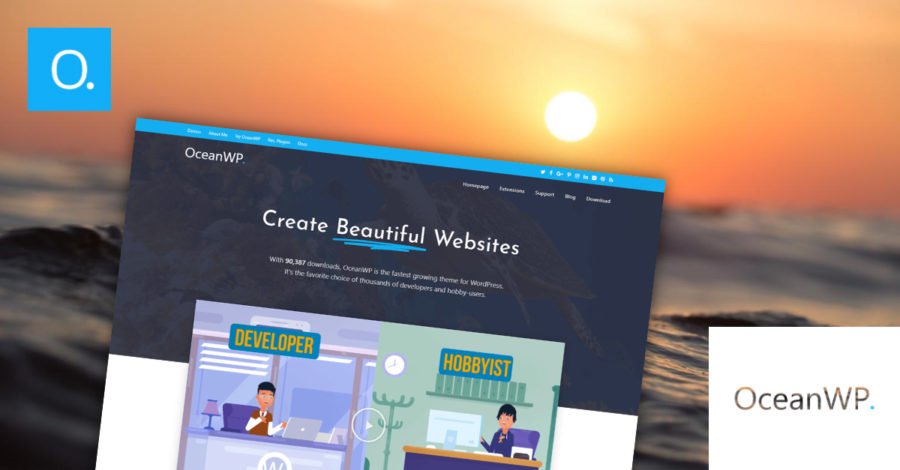
You might be tired of hearing people tell you that you “need to build an email list”. But you see this advice so much for a reason. For any business, email marketing is one of the top-performing channels, with an impressive median ROI of 122%. Basically – it’s hard to ignore!
But despite email marketing’s effectiveness, a lot of businesses struggle to actually build their list in the first place. In fact, most websites using a generic email opt-in form convert less than 2% of visitors. Yikes! For a business owner, that’s a lot of cash left on the table.
So, how do you get more opt-ins from the traffic you’re already receiving?
One proven method is lead magnets.
West Elm store sends a 15% discount coupon code to your email after you subscribe
A lead magnet is something valuable you offer to website visitors in exchange for their email addresses. Like a discount or free shipping provided by ecommerce stores after a sign-up. But lead magnets go beyond just “bribing” your visitors with discounts. You can also share special content, like a video, PDF, or even an Excel sheet.
For example, look at how SEO expert Matt Diggity uses his Backlink Blueprint to boost his email list:
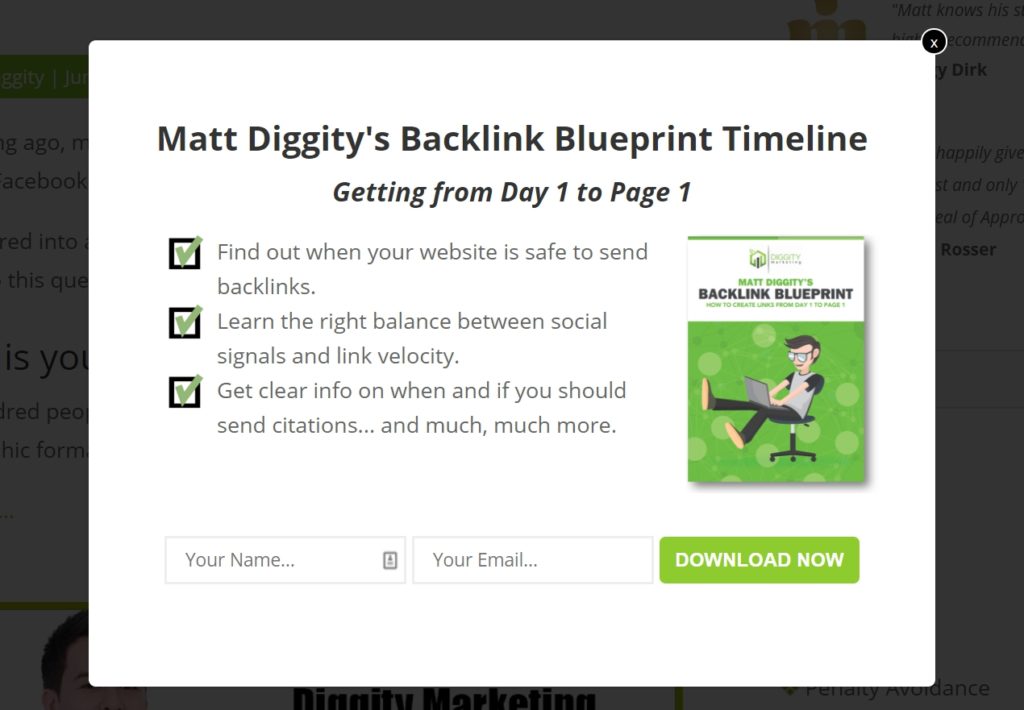
In the rest of this article, you’ll learn how you can create list-boosting lead magnets for your own site, complete with plenty of real-life examples for inspiration!
What makes an effective lead magnet?
Some marketers compare lead magnets to ethical bribes. That’s because to work well, they should be irresistible. To show just how irresistible (and therefore efficient) some of the lead magnets may be, here is a brilliant case study shared by Matthew Woodward. He managed to increase his email conversion rate by 469% – from 1,07% to 5,81% – practically overnight.
So, what’s the science behind lead magnets? And what makes the big difference between the good ones and the great ones? Three things:
- Specificity
- Instant value
- Unique knowledge.
Specificity
As a rule of thumb, the more your magnet is tailored to your audience, the better it performs. So, instead of offering a generic piece of content or a broad set of tools, you should prepare a laser-focused solution to a specific problem you know your visitors have. Ebooks are great, but sometimes a specific one-pager with a list of actionable ideas and resources can be even more effective.
Compare these two incentives:
“Everything you need to know to become a freelancer” vs “5 websites to find your first freelance gig today”.
The second one sure sounds more appealing because we know exactly what to expect, and someone who’s dying to become a freelancer is going to jump at that incentive because they want their first job now.
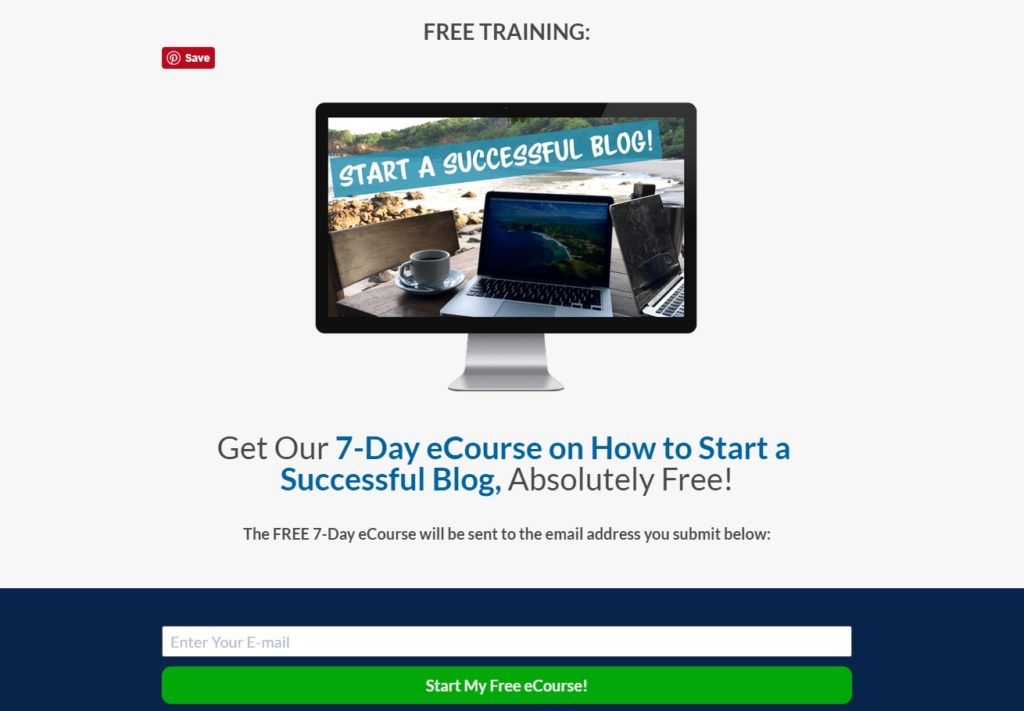



Instant value
People hate waiting. And when it comes to lead magnets, not only do they want immediate delivery, but they also want to make use of them as soon as possible. This is why longer formats – like Ebooks, month-long courses, or webinars scheduled for the next week – may perform poorly in comparison with a discount or a piece of knowledge that can be applied right away. And this also explains why offering a newsletter is such a weak “bribe” – it just doesn’t provide instant gratification.
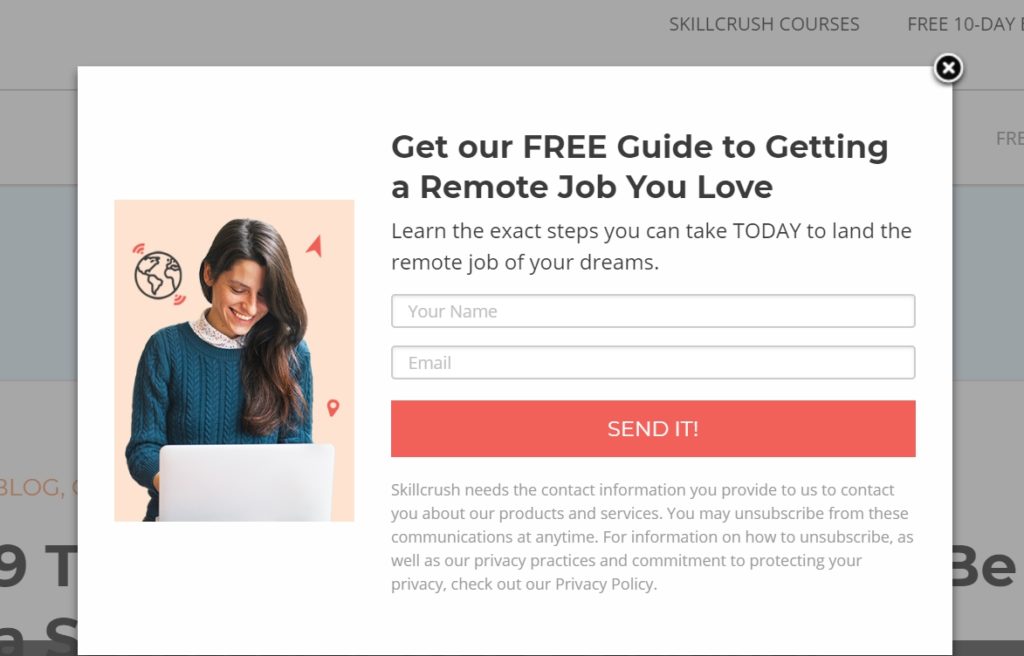



Unique (ideally practice-based) knowledge
If you ever struggled with finding a solution to a stubborn problem, you probably know how much time can be spent on research alone. The trial and error path is often exhausting and daunting. And when you are in this situation, learning the nuts and bolts of how someone successfully overcame a similar struggle is priceless.
That’s why unique experience-based knowledge offered in a lead magnet is the strongest trigger for someone to subscribe. A path already walked and validated by an authoritative person saves so much time and energy, its value is incomparably high.
In fact, if you have that secret sauce you’re willing to trade, you don’t even have to worry about the packaging because it’s the content itself your subscribers care about the most. Look at the famous case study from Tim Soulo, where the only thing he promised in exchange for an email is a subject line he used to get the attention of Rand Fishkin – the Founder of Moz.
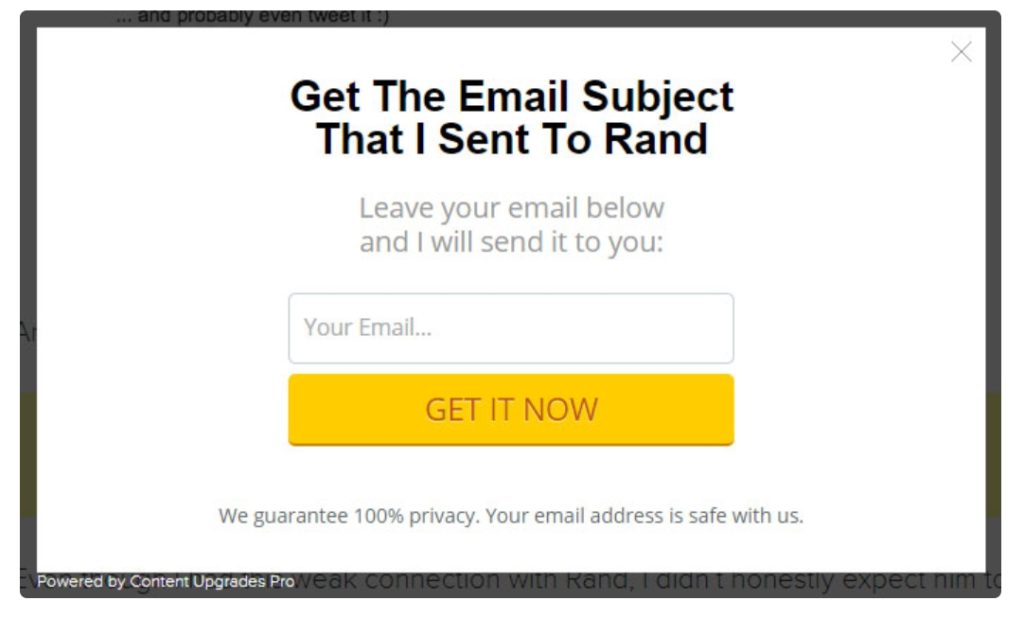



Tim Soulo, Head of Marketing at Ahrefs spent 20 minutes to prepare this lead magnet and got a solid 8% email opt-in conversion rate
How to find ideas for a lead magnet
Chances are, you already have an image of a customer persona that influences some of your business decisions. And if you do, you should know very well what your audience’s pain points are, and how you can help overcome them.
If you already have a busy website, you can find inspiration in the emails sent to your customer support team, live chat conversations, and even blog comments. In fact, if you have a blog, go to your Analytics tool and see which pages are the most popular, where people spend the most time reading and actively interacting with the page. The answers will become your gold mine for ideas.
If you’ve just started with your website and haven’t had a chance to establish that level of engagement with your audience, you can go ahead and conduct a field study. Niche forums and communities are literally the best places to do that.
Take Quora as an example. If you go there and type your website topic in the search field, you’ll immediately get dozens of ideas.
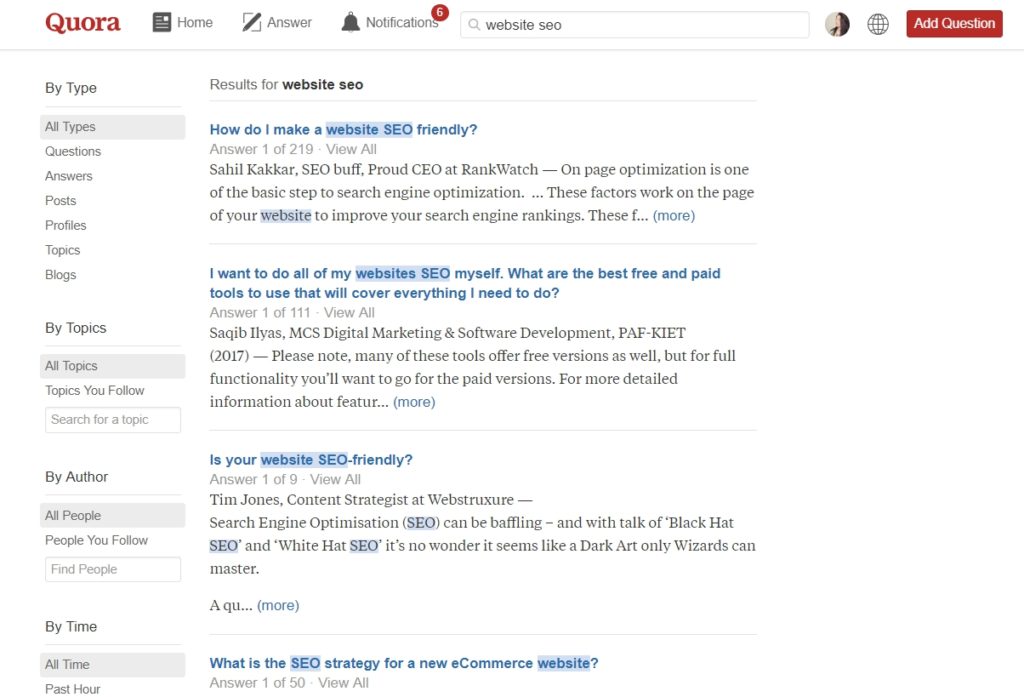



Go to any other niche community to search for questions related to your website topic
Not only will you find out the most pressing questions your target audience has, but you’ll also be able to pick up specific keywords and phrases so that your CTAs (calls to action) will be written in the same exact language your audience uses.
Setting up lead magnet delivery
Now that you have an idea of what type of a lead magnet might work for your business, here’s how you can actually implement it.
First, you may want to choose the way to present a lead magnet. While there are few websites still using static email opt-in forms, you have a higher chance to get your visitors’ attention with a pop-up. It can be triggered by an exit-intent or appear after a user has spent some time on a page – both options will do the job.
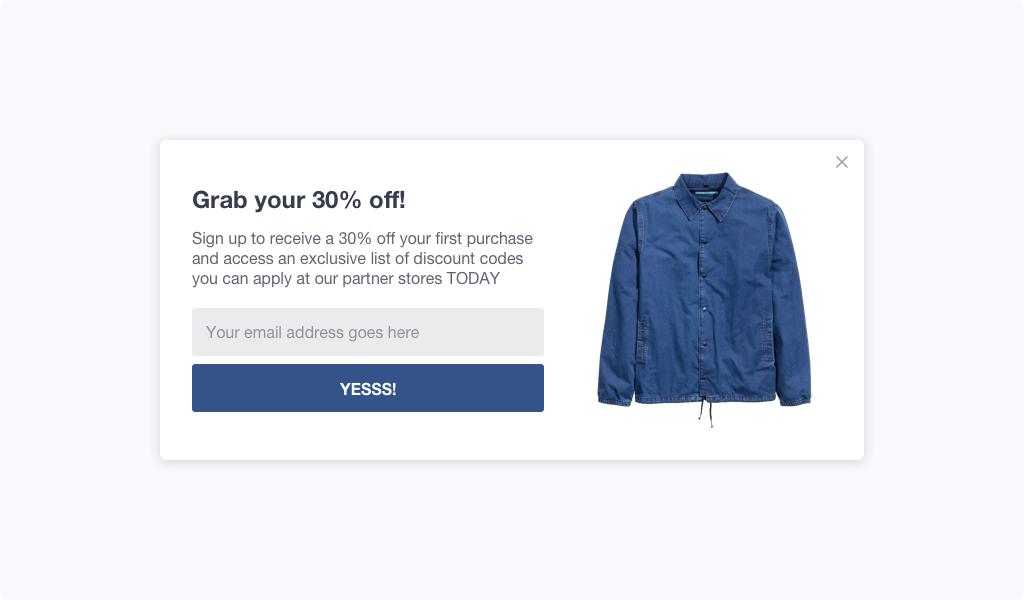



In this article, we’ll be using GetSiteControl subscription forms as an example, but technically you can use any email opt-in service of your choice.
GetSiteControl includes multiple tools for user engagement – email, contact, and survey forms, Live Chat, notification bars, and social media buttons. That broadens your capabilities a bit, and overall, having several widgets in a single dashboard is quite convenient.
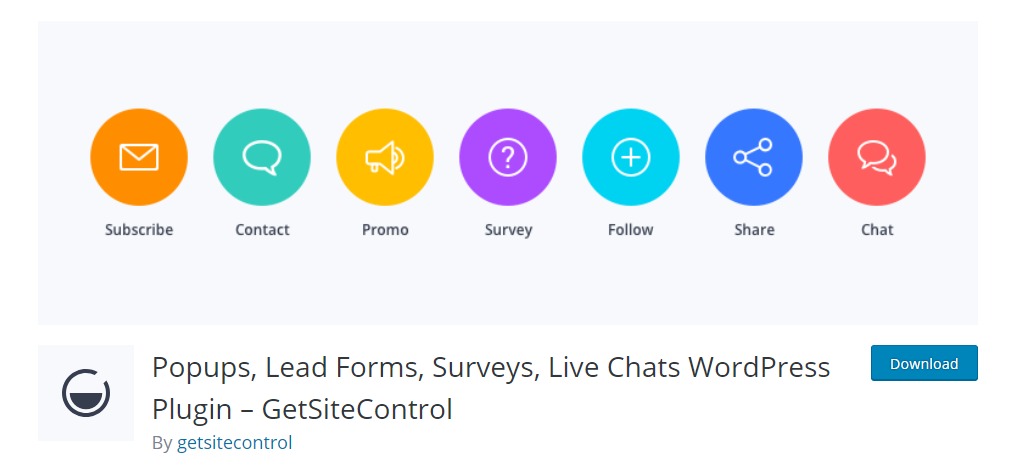



So, going back to lead magnets, there are two easy ways to deliver them.
First, you can redirect your new subscribers to a hidden post or just any page on a website after they sign up. To do so, you will need to create a form and set up a success message that will appear after someone fills it out. Then, either apply an automatic redirect to another URL or add a link to the message body, as shown in the example below.
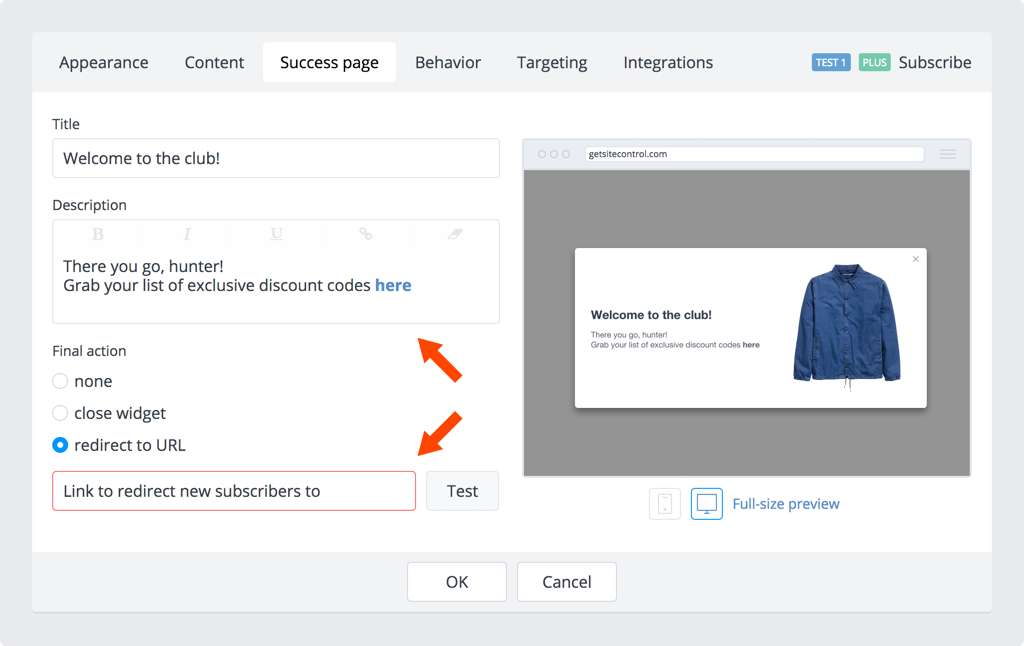



The Success Page feature allows for delivering lead magnets right on the spot
The second way to deliver a lead magnet involves using an Autoresponder.
If you use an email marketing service, you must be familiar with this feature. It allows you to create a message that is automatically sent to new subscribers. All you need to do is add a link to the lead magnet to the welcome email body.
You’ll find integrations with all the popular email marketing apps available in the GetSiteControl dashboard. So, if you already have an autoresponder set up and running with a 3rd-party app but want to use GetSiteControl forms for lead generation, just connect it with your email marketing service using the list in the dropdown menu on the right.
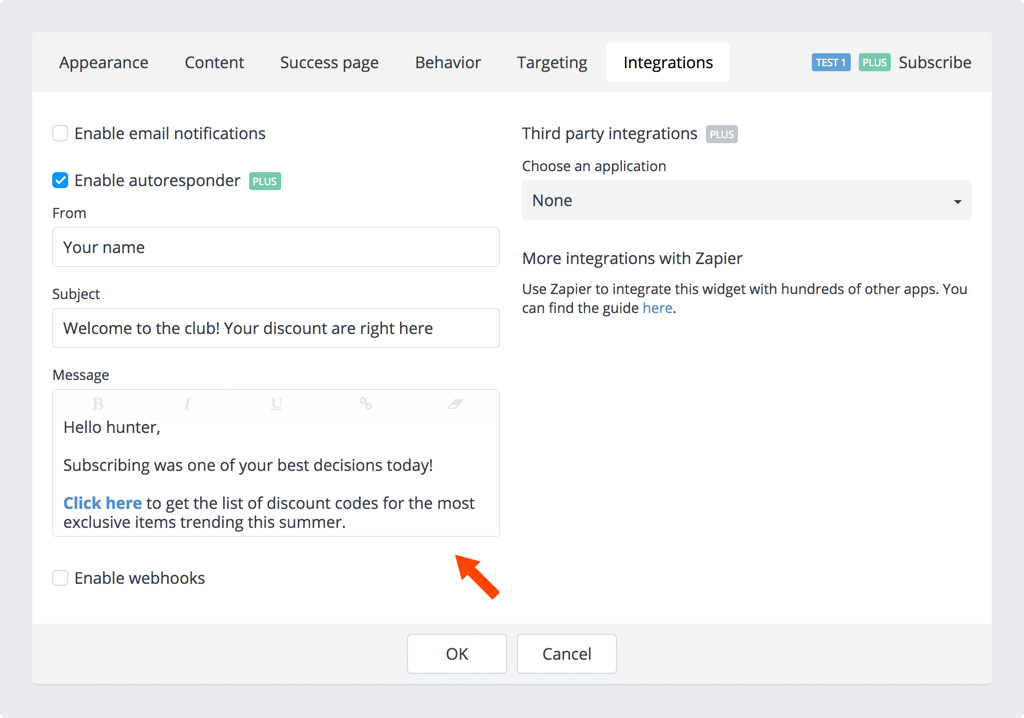



Setting up an Autoresponder message in GetSiteControl
Optimize your lead magnet
Once you notice the first spikes in your email opt-in conversion rate, it might be the time to optimize performance and achieve even better results. There are few ways to do it.
A/B test the lead magnet. Remember we talked about knowing what your audience wants? Right. The best way to figure this out without asking them directly will be conducting a good old split test. You can offer two different lead magnets or vary the delivery formats (video versus text) to see which one brings more subscriptions.
Optimize the email opt-in form. Once you get the winner, why not go an extra mile and A/B test the subscription form itself? Feel free to vary the copy, the call to action, the creative, and even the button if you’d like to find the optimal combination for your lead generation machine.
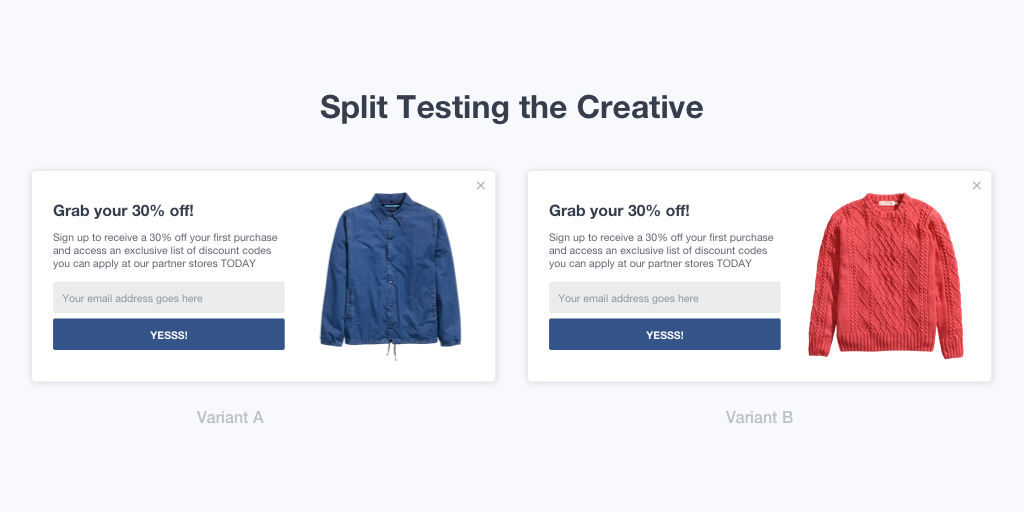



Create content-specific lead magnets. This method might be the most time consuming, but it’s been proven to deliver the most impressive results. The trick is to offer different lead magnets on different pages to laser-target your lead magnets and make them more relevant. In other words, you should offer SEO-related lead magnets on the pages about SEO, email marketing lead magnets on the pages with email marketing related content – you got the idea.
Single post specific lead magnets are called “content upgrades”. That means you are supposed to create unique bonuses for each blog post. But before thinking about how much time this amount of work may take you, check out this detailed Backlinko case study on content upgrades converting at 65% and remember that it’s well worth the effort.
Wrapping up
Magnets can be a lead generation powerhouse. The best part about them? You can use almost anything to attract new subscribers: Ebooks, cheat sheets, toolkits, blueprints, reports, courses, webinars, videos, discounts, a free version of your software, early access to beta, or even your personal time (yes, I’ve seen some consultants using this incentive!).
At the end of the day, it’s not about the format – but about the value you provide.
And if you ever hesitate to give something away for free, just remember about the efficiency of email marketing and think of lead magnets as one of your greatest investments.
Are you using lead magnets on your website or just thinking about creating the first one? Share your thoughts in the comments below!


